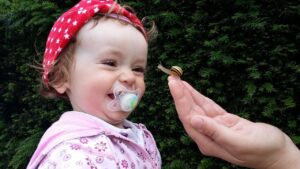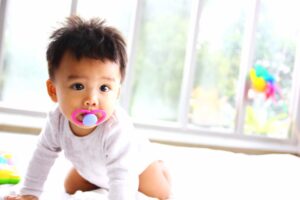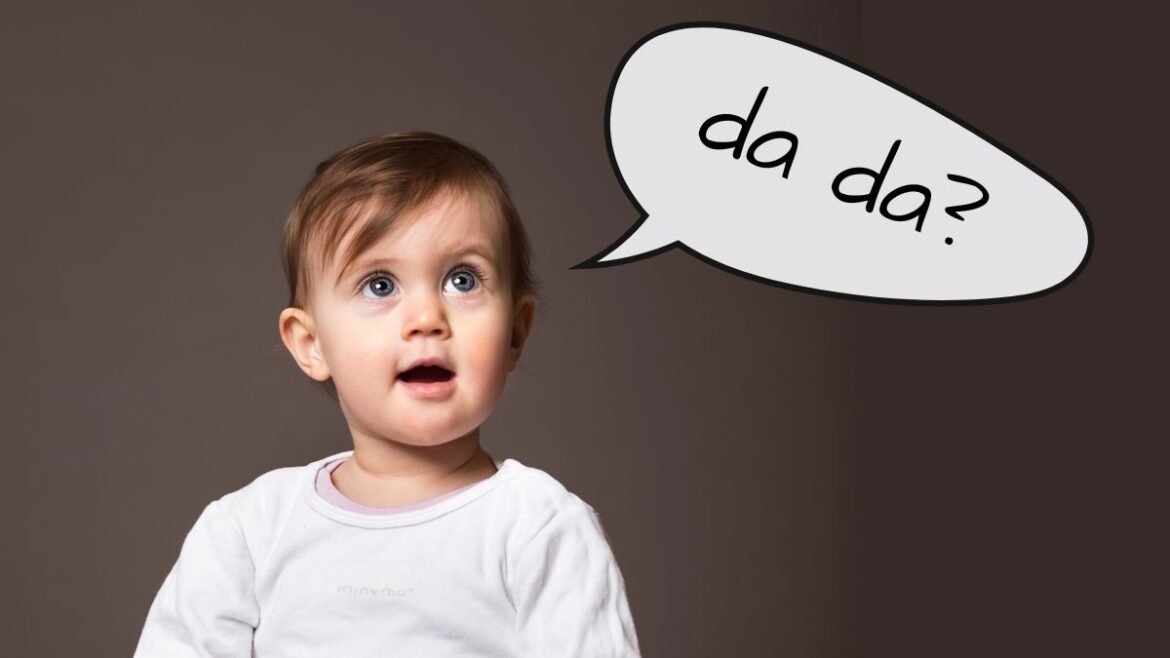Pacifiers can feel like a lifesaver for parents—soothing fussy babies and ensuring much-needed calm. But do pacifiers come with hidden risks, especially concerning your child’s speech development? It’s a question that sparks concern among parents and caregivers. In this post, we’ll dive into the science, expert opinions, and practical advice to answer this pressing question: Do pacifiers delay speech?
Understanding Speech Development in Infants
Speech development is a complex process that involves the coordination of cognitive, auditory, and motor skills.
Key Speech Milestones in Babies
- Babbling (4–6 months): Babies begin experimenting with sounds like “ba” and “da.”
- First Words (10–12 months): Simple words like “mama” or “dada” emerge.
- Word Combining (18–24 months): Toddlers begin combining two or more words to form simple sentences.
These milestones vary, but a significant delay may indicate developmental issues. Factors such as genetics, hearing ability, and environmental stimulation all play roles.

What Are Pacifiers and Why Are They Popular?
Pacifiers are small, nipple-shaped objects designed to satisfy a baby’s natural sucking reflex. They provide comfort, help soothe colicky infants, and even reduce the risk of sudden infant death syndrome (SIDS). However, their extended use raises questions about potential impacts on oral and speech development.
Benefits of Pacifiers
- Comfort and Security: Pacifiers calm babies during stressful situations like vaccinations or long car rides.
- SIDS Prevention: Studies suggest that pacifiers reduce the risk of SIDS when used during sleep.
While pacifiers have clear benefits, overuse may lead to concerns such as speech delays, dental problems, and dependency.
Can Pacifiers Delay Speech?
The short answer: Pacifiers can contribute to speech delays, but the connection is indirect and depends on usage habits.
How Pacifiers Might Impact Speech Development
- Reduced Babbling Time: Prolonged pacifier use may limit the time babies spend exploring sounds, a crucial part of language development.
- Oral Muscle Development: Speech requires well-coordinated movements of the tongue, lips, and jaw. Excessive pacifier use could hinder these muscles’ development.
- Limited Interaction: Babies with pacifiers in their mouths might be less likely to engage in vocal interactions with caregivers.
What the Research Says
Some studies suggest prolonged pacifier use correlates with speech delays, especially when used beyond 12–18 months. However, others argue the impact is minimal if used appropriately. The key lies in balance and moderation.
Guidelines for Pacifier Use to Avoid Speech Delays
Parents can reap the benefits of pacifiers while minimizing potential downsides with mindful practices.
1. Time Limits
- Restrict pacifier use to naps and bedtime after 6 months.
- Gradually phase out pacifier use by 12–18 months to avoid dependency.
2. Encourage Vocal Play
- Spend time talking, singing, and reading to your baby.
- Encourage babbling and mimic your baby’s sounds to foster interaction.

3. Choose Orthodontic Pacifiers
Opt for pacifiers designed to support oral development, reducing the risk of misaligned teeth or speech issues.
Alternatives to Pacifiers for Soothing Babies
If you’re worried about the impact of pacifiers, consider these alternatives:
- Comfort Items: Soft toys or blankets can provide a sense of security.
- Rocking and Cuddling: Physical touch and movement help soothe babies naturally.
- White Noise: Gentle background noise mimics the womb’s sounds and calms infants.
Signs of Speech Delay to Watch For
Early detection of speech delays is vital. Look out for:
- Lack of babbling by 12 months.
- Difficulty forming words by 18 months.
- Limited vocabulary or inability to combine words by 24 months.
Consult a pediatrician or speech-language pathologist if you notice these signs.
When to Consult a Specialist
A professional evaluation is crucial if your child’s speech development seems delayed despite limited pacifier use. Experts can identify underlying causes such as hearing impairments, oral-motor issues, or neurodevelopmental conditions.
The Bottom Line: Balance Is Key
Pacifiers themselves aren’t inherently harmful, but their misuse can potentially contribute to speech delays. By following recommended guidelines and prioritizing interaction with your baby, you can foster healthy speech development while still reaping the benefits of pacifiers.

FAQs
1. How long is it safe to use a pacifier?
It’s best to wean your child off pacifiers by 12–18 months to minimize speech and dental development risks.
2. Are all pacifiers the same?
No. Orthodontic pacifiers are designed to reduce dental and oral development issues, making them a better choice.
3. Does pacifier use affect teeth?
Prolonged pacifier use may cause misaligned teeth or bite issues, especially after age 2.
4. Can pacifiers be used for breastfed babies?
Yes, but it’s advisable to introduce pacifiers only after well-established breastfeeding (around 3–4 weeks).
5. What’s the biggest factor in preventing speech delays?
Interaction is key! Talk, read, and engage with your baby daily to encourage healthy language development.

